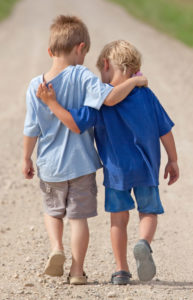Helping Your Child Develop Empathy
A young child’s social-emotional development conjures up many images –a young child getting dressed or taking turns with a peer. But what about empathy? By definition, empathy is the ability to identify with and understand another person’s feelings, situation, or motive and then respond with care. It is a complex skill to develop.
Consider the life of a young child and its focus: ME, MINE and I. Young children can be egocentric and solely focused on themselves and their immediate needs. However, developing a sense of empathy occurs in early childhood. The good news is that understanding and showing empathy is the result of numerous social-emotional skills, which are developing in the early years.
 The benefits of a strong sense of empathy include: self-regulation of emotions; a sense of security; strong relationships with peers, parents and teachers / caregivers; an overall decrease in bullying; and success in school. Children and teens who have the greatest amount of skill at empathy are viewed as leaders. Adults with a sense of empathy are more successful in leadership positions, have greater success personally and professionally, possess a higher level of overall happiness, have lower levels of stress, and are able to deal successfully with conflict.
The benefits of a strong sense of empathy include: self-regulation of emotions; a sense of security; strong relationships with peers, parents and teachers / caregivers; an overall decrease in bullying; and success in school. Children and teens who have the greatest amount of skill at empathy are viewed as leaders. Adults with a sense of empathy are more successful in leadership positions, have greater success personally and professionally, possess a higher level of overall happiness, have lower levels of stress, and are able to deal successfully with conflict.Developing empathy is a gradual process. As a parent you are your child’s best teacher. Help teach your kids empathy by being a kind and empathic role model, showing respect and care for others, acknowledging your child’s feelings and concerns, helping your child name his feelings, and caring for animals or plants. Finally, be careful not to “fix” the situation –to make the feelings go away because you want to protect him from any pain. That situation or those feelings improve your child’s ability to persevere and build resilience.
The library has a variety of books related to feelings. Here are a few of my favorites.














